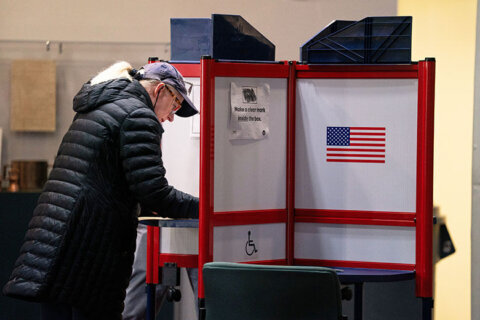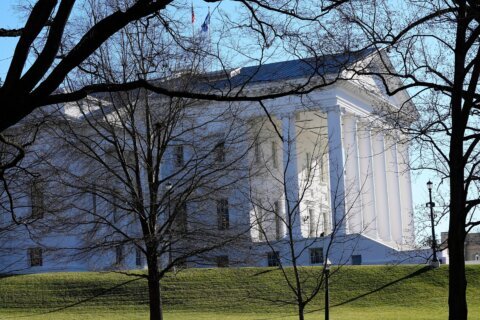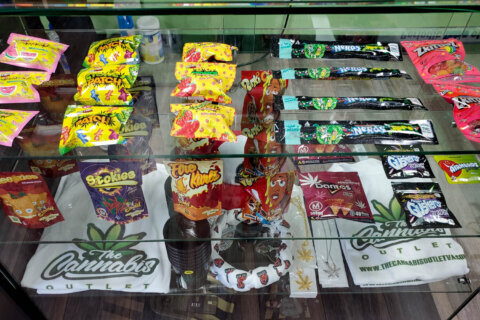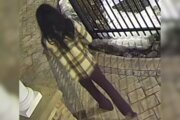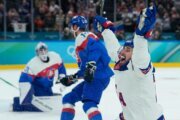This article was republished with permission from WTOP’s news partner InsideNoVa.com. Sign up for InsideNoVa.com’s free email subscription today.
This article was written by WTOP’s news partner InsideNoVa.com and republished with permission. Sign up for InsideNoVa.com’s free email subscription today.
The Virginia High School League’s Executive Committee approved Wednesday a policy it said is designed to only guide student-athletes who are offered or are seeking name, image and likeness deals.
VHSL executive director Billy Haun addressed the media afterward to clarify what the policy is and what it is not.
“The VHSL policy is not a policy giving permission for NIL to happen,” Haun said. “NIL is already here. We already have teenagers, high-school aged students who have been offered NIL deals. Those NIL deals are not coming through the schools. Those are coming through other opportunities where students are out playing.”
In January, the league’s executive committee recommended a proposal by a vote of 31-0 to assist student-athletes if they are offered the opportunity to profit off autographs and personal appearances among other items. The proposal went to a second vote Wednesday when the executive committee met again. It passed, 32-1.
The policy now goes into effect July 1.
“We did not pass a policy today to say yes you can do this, no you can’t do this,” Haun said. “I don’t feel the Virginia High School League has the authority to do that. What we can do is provide some guidance for our student-athletes and for their parents and for their coaches that will help keep students eligible and to not violate Virginia High School League policies on eligibility and being an amateur.”
Currently, 26 states, including Maryland, have already adopted policies to guide high school athletes through NIL’s, according to businessofcollegesports.com. The District of Columbia has also a similar policy.
Haun said the VHSL’s policy is not much different from most other state’s policies. Once the VHSL looked at what some other states did, Haun said the league used an NIL consultant to help them form their policy along with the VHSL’s legal counsel.
“We did not go out and try and reinvent the wheel,” said Haun, who expects NIL deals to require updates and revisions over the next year.
Athletes can profit from the following:
• Product endorsements
• Personal appearances
• Autograph sessions
• Merchandise or apparel sales
• Group licensing
• Acting as a social media influencer
Athletes may not be compensated if they:
• Use money from a potential NIL deal to determine enrollment at a school or membership on a team.
• Or if they use any item that associates them with their high school, district region or the VHSL (uniforms, logos, marks, mascots, etc.)
In addition, “students may not engage in any NIL activities involving, displaying or endorsing the following categories of products and services:
• Adult entertainment products and services
• Alcohol products
• Tobacco and electronic smoking products and devices
• Opioids and prescription pharmaceuticals
• Controlled dangerous substances
• Casinos and gambling, including sports betting
• Weapons, firearms and ammunition
Also “no school or anyone employed by or affiliated with a member school, including booster clubs, coaches, administrators, alumni or an NIL Collective, may solicit, arrange, or negotiate compensation for a student’s NIL other than their own child.”
An NIL Collective is defined as “a group of alumni, supporters, parents, or other people who form a corporation, limited liability company, partnership, non-profit organization foundation, or other entity to provide NIL opportunities to student-athletes of a specific school.”
Students must notify their principal or activities director in writing “upon entering into any type of NIL contract within 72 hours of entering into the contract.”
“If you engage in an NIL activity outside of school, then here’s the rules you that must follow in order not to become ineligible or violate the amateur rule status,” Haun said. “Not approving a policy with some guidelines would not be helping out student athletes or their parents or their schools.”

